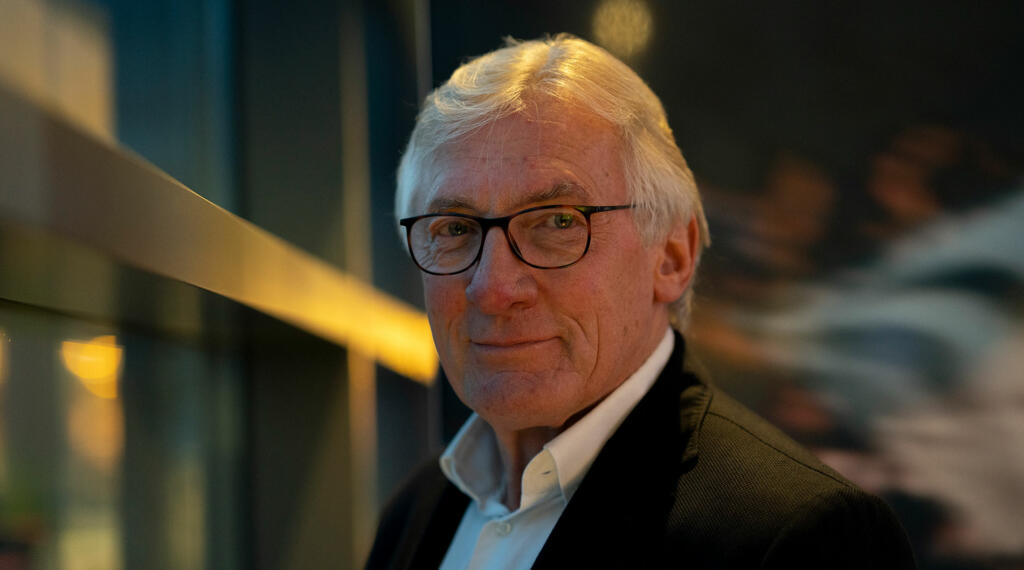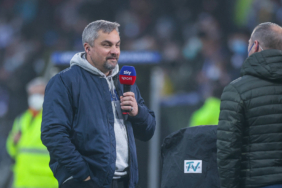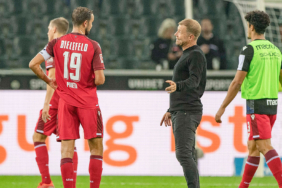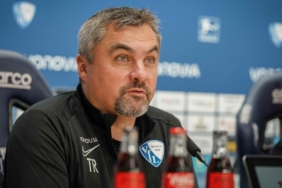It all began at Fortuna Millingen, on the Lower Rhine. Franz-Josef Tenhagen, whom the football world only knows and calls “Jupp”, started his career at the small club from the district of Rees on the Lower Rhine. Initially in a multifunctional role, he later specialised in the defensive area and became one of the best defenders in the Bundesliga. Tenhagen was long regarded as the successor to Franz Beckenbauer. 457 Bundesliga games, not all of them for VfL: on the occasion of his 70th birthday on 31 October, Jupp Tenhagen reviews his great career. We would like to take this opportunity to congratulate you, dear Jupp!
Hello Jupp! There are hardly any better dates than 31 October to celebrate one’s birthday, after all, it is always followed by a public holiday and one could really let it rip. Does that also apply to your seventieth?
Tenhagen: No, this time it will be celebrated in a small circle. I celebrated my 50th birthday extensively, but for my 60th we were only together in the closest family circle. But it’s true, my parents chose the date of my birth very well back then… (laughs).
We’re going back to your footballing roots, which lie with Fortuna Millingen. The internet doesn’t tell us much about this club. Can you help us?
It was a club that played in the Bezirksliga back then and is now in the Kreisliga. I played several positions there, even in goal once. From the C-youth, but at the latest from the B-youth, I was used exclusively in midfield.
How did your first Bundesliga club, Rot-Weiß Oberhausen, become aware of you?
Through the selection teams. I played for the district selection, the Lower Rhine selection, the West German selection and finally the DFB youth selection. There were always scouts on site at the respective training courses who recommended me to others. Several clubs approached me, including MSV Duisburg and RW Oberhausen. I then decided on Oberhausen.
Did you also play in midfield for RWO?
Yes, it was only later, at VfL Bochum, that I was used as a libero.
From 1971 to 1973 in Oberhausen, from the district league straight into the Bundesliga. 64 games for RWO, then VfL came knocking. How did that happen?
Oberhausen were relegated because the club was involved in the so-called “Bundesliga scandal” at the time. However, the events took place before my time and were uncovered when I was already playing for RWO. President Peter Maaßen and coach Günther Brocker were suspended, RWO finished bottom of the table. The Bochum chairman Erwin Höffken called me and came by with a big bouquet of flowers for my wife and a greeting from Ottokar Wüst. I met with him a short time later and it wasn’t long before the contract was signed and I moved to VfL Bochum. There were other offers, but Bochum was quicker.
Your impressions with and at VfL? You were more or less the undesirables, even before the word was invented.
I was given an excellent welcome. We defined ourselves through community and camaraderie, and that was the only way we could survive in the Bundesliga. Besides younger players like me, there were some seasoned and experienced players who led us: Hans Walitza, Dieter Versen, Erwin Galeski, Werner Scholz, later Klaus Franke.
You were VfL’s first senior international, the legitimate successor to Franz Beckenbauer. Three international matches followed, including one in front of a record crowd in Brazil.
I had already played in the German U23 and B national teams. When Franz Beckenbauer left the Bundesliga and moved to Cosmos New York, the position of libero in the national team was initially filled by me. The first international match took place in Belgrade, against Yugoslavia. In the second game, in the legendary Maracana in Rio de Janeiro, there were 160,000 spectators – the biggest crowd I’ve ever played in front of! Really amazing! The dimensions in the stadium were impressive, the dressing room, the warm-up hall. The game was part of a South American trip, on which we also stopped off in Argentina and Mexico. The third and last international match took place in Dortmund at the end of 1977, against Wales. Germany were world champions, but didn’t have to qualify for the 1978 World Cup.
Why wasn’t there more?
I was at the last training course before the World Cup at the Malente Sports School. The national coach at the time, Helmut Schön, told us that he would name the squad – but not when and how. He did so the following weekend, when the names were read out in the ZDF sports studio. There was no personal contact before that. That disappointed me and I said so publicly. It probably didn’t go down well with the DFB. Schön had to leave after the World Cup, and his former co-coach Jupp Derwall took over. But I never heard from the DFB again. That also applied to the other two non-nominees, Manfred Burgsmüller and Rudi Seliger.
Your active time at VfL was split in two, in between there were three years in black and yellow. Another transfer to secure the licence for VfL?
I actually intended to continue my career at VfL and had signed a three-year contract. Then came the ominous call from the VfL board, not from Ottokar Wüst, but someone else. The content was clear: we have to sell you to get the licence. Naturally, there was a huge disappointment in me because I had decided in favour of VfL. If I hadn’t left VfL, it would have been very tight – both as far as the licence for the Bundesliga was concerned, but also for the Second Division. Branko Zebec, the BVB coach, really wanted me. So just before the transfer deadline, I accepted and moved to Dortmund. It was also a challenge for me because Dortmund had other ambitions than VfL. We then also achieved places to play in the UEFA Cup.
Speaking of Zebec, who was your best coach?
Heinz Höher was already very good. At that time, he had the VfL play with a space defence and introduced the offside trap. But Branko Zebec was even better tactically, we could all learn something from him. It helped my defensive play enormously.
How did your return to Bochum go?
I had the option to return to Bochum written into my Dortmund contract. After three years, I took it out and returned to VfL. Rolf Schafstall was coach at the time. In 1986, there was a change in the coaching position from Schafstall to Hermann Gerland. My contract expired and Hermann said to me: Jupp, I don’t necessarily need you as a player, but as a co-trainer. So I became playing co-trainer. And when Gerland joined 1.FC Nürnberg, I was asked by Ottokar Wüst if I could imagine being head coach. I thought about it for a long time because I didn’t have the necessary licence. At that time, you could be a coach with a special permit, but you had to attend a training course. And that proved to be problematic in the course of the season. After a good first half of the season, we lost ground in the second half when I was often unable to arrive from a training course until the final training session on Friday. It got tight, but we managed to stay in the league. However, we agreed on an early end in the summer because the coaching course was still running until September.
You were there in the 1988 DFB Cup final, but “only” as a co-trainer.
Thomas Kempe was absent due to a yellow card, he had picked up his second yellow card in the semi-final. I was fit, had played in the season finale in Leverkusen the week before and had also helped out with the amateurs. But Hermann Gerland had opted for Lothar Woelk, and Ata Lameck also had to watch. Nevertheless, the DFB Cup final in Berlin was an unforgettable experience, a real highlight.
Any other memories of fabulous VfL moments?
There were a few. In addition to the cup final, the victories over Bayern Munich or the Revierderbys, the games in Herne also remain in the memory. Due to the stadium reconstruction in Bochum, we had to move to Schloss Strünkede in Herne and, despite all the predictions, we managed to stay in the league. The fans carried us on their shoulders, I was wearing hardly more than my trousers at the end.
After VfL, you coached Fortuna Köln, Wattenscheid 09, LR Ahlen and twice 1.FC Bocholt. Any special features?
First and foremost, of course, there were the club patrons: Jean Löring at Fortuna, Klaus Steilmann at Wattenscheid and Helmut Spikker at Ahlen. Löring and Steilmann in particular always wanted to be very well informed when it came to the team’s concerns. Things were hardly any different in Ahlen. With Wattenscheid, we were promoted from the Regionalliga to the Second Division, and the same was true of Ahlen. With Bocholt, we qualified for the newly introduced Regionalliga. That’s where I worked the longest, first for five years, later for another four years.
After VfL, you coached Fortuna Köln, Wattenscheid 09, LR Ahlen and twice 1.FC Bocholt. Any special features?
First and foremost, of course, there were the club patrons: Jean Löring at Fortuna, Klaus Steilmann at Wattenscheid and Helmut Spikker at Ahlen. Löring and Steilmann in particular always wanted to be very well informed when it came to the team’s concerns. Things were hardly any different in Ahlen. With Wattenscheid, we were promoted from the Regionalliga to the Second Division, and the same was true of Ahlen. With Bocholt, we qualified for the newly introduced Regionalliga. That’s where I worked the longest, first for five years, later for another four years.
Of your teammates, who are you closest to after all these years?
I’m still in touch with many of them, we still meet regularly, but my closest contact was with Ata Lameck, with whom I still get on very well today.
Among the opponents, who were the most outstanding?
Oh, there were some outstanding players. But Diego Maradona occupies a special place. We once played with Borussia Dortmund in Barcelona, and I was able to see his skills live.
In the past six years, you have been active for VfL again, first as a co-opted member of the Supervisory Board and later as an elected member of the Executive Committee. How do you look back on this time? What were the most important decisions you made?
A lot has been achieved in the past few years in particular. We managed to consolidate VfL economically, then came the Corona pandemic with the lockdown. It was a difficult phase, but we were able to get through it thanks to the calm that prevailed within the club. At the same time, the team found its feet and developed in the direction that enabled us to move up to the Bundesliga. Thomas Reis played his part in this development, that is undisputed, as he did in keeping us in the league last season. Things didn’t go well this season, so it was logical to part ways with Thomas. Under the new coach Thomas Letsch, the VfL is apparently once again in a position to build on the performances of the previous season, as the most recent home games have shown, with victories against Frankfurt and Union Berlin, two top teams in the Bundesliga. However, the away performances, with the exception of the cup games, are not yet what we would like to see in order to score points there as well. I hope we see a different VfL in the Revierderby on Saturday. Economically, VfL is very solid again, that’s important, despite the Corona-related losses. It’s well known that we still have the lowest budget in the Bundesliga. And yet we have a chance of staying in the league.
Jupp Tenhagen, thank you very much for the detailed interview. On behalf of VfL, we wish you a happy birthday, a wonderful celebration and, above all, the best of health and good luck in the new year!















